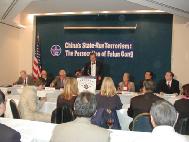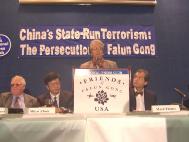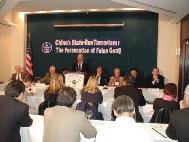Panel Discussion Focuses on China's State Terrorism at National Press Club
A distinguished panel comprised of guests from the academic, religious, governmental and other sectors gathered at the National Press Club in Washington, D.C. to discuss the topic of "China's State-Run Terrorism: The Persecution against Falun Gong" on Wednesday, October 10, 2001.
The panel was sponsored by the non-profit group Friends of the Falun Gong (FOFG) and was moderated by a member of the FOFG Board of Trustees and former U.S. Ambassador to Hungary, Mark Palmer. He opened the panel by citing a document issued by the UN Human Rights Commission in August of this year that states: "State terrorism -- or 'terror from above'-- is... the type of terrorism that historically and today produces the most harm."
Mr. Palmer pointed out that even though Falun Gong is the largest victim of state terrorism in the world and hundreds have been killed and more than 50,000 have been detained, it is remarkable it has not resorted to terrorist tactics or violence. He said: "In my view, the Falun Gong movement is the most important, the most powerful, and the most peaceful movement since Gandhi's non-violent movement in India." Mr. Palmer also made it very clear that the persecution against Falun Gong is not the will of the Chinese people but very much the act of one man -- Jiang Zemin.
Mr. Palmer next introduced Falun Dafa practitioner Professor Shiyu Zhou from the University of Pennsylvania, who gave a comprehensive introduction to the subject of the secretive and deadly "610 Office," which was established on June 10, 1999. Professor Zhou said that the 610 Office is directly responsible for tens of thousands of arrests, thousands of mental hospital abuses, and hundreds of killings of Falun Gong practitioners in China in the past two years.
James Standish, Deputy Secretary General of the International Religious Liberty Association, spoke about his understanding of what 'state terrorism' means. He pointed out three main features: 1. Cruel and unusual punishment, including prolonged torture -- often to the death -- and extreme psychological duress; 2. Punishment by proxy, meaning punishing the friends or loved ones of the target; 3. Group punishment or group reprisals, which was a tactic widely used in Nazi Germany where whole villages would be destroyed if a few people in the village offended the authorities. He also made the point that it is dangerous to overlook suppression of conscience because history tells us that a government that uses violence against its own people will usually expand its violence beyond its borders. Moreover, suppression of conscience will result in extremism, which is like a pressure cooker that results in instability when it finally erupts.
Harry Wu, Executive Director of the Laogai Research Foundation, spoke from his own experiences, having himself been in a laogai camp for 19 years. Mr. Wu has many friends who are Falun Gong practitioners. He said: "They are all very good people, and you can trust and rely on them. They have no guns, nor do they have any designs to overthrow the government. And yet the [PRC] government cannot even tolerate people like this." He added: "President Bush said 'fascism and totalitarianism are the breeding grounds of terrorism,' and China is the biggest totalitarian regime." He said: "We must help the Falun Gong practitioners, not for political reasons but out of humanity."
Senior State Department Policy Advisor George Lister spoke on how the issue of human rights has improved US foreign policy since the 1970's. He also pointed out that criticism of human rights violations is not interference in the internal affairs of other countries. He called upon those in attendance to bring up their issues directly to the State Department and let them know what they can do to improve human rights in China. Asian Studies Professor Joseph A. Bosco of Georgetown University's School of Foreign Service spoke about how there is a direct relationship between the nature of a regime and its human rights record. He also pointed out that China has long sold arms to countries that practice terrorism just as it engages in terrorism within its own borders.
Dr. Leila F. Dane, President of the Society for the Study of Peace, Conflict and Violence spoke briefly about the trauma that terrorism brings to the individual and the society.
James Carpenter, a civil rights attorney was the final speaker. He gave a few very useful suggestions to Falun Gong practitioners.
In the aftermath of the September 11 terrorist attack, US President Bush stated: "Every nation, in every region, now has a decision to make. Either you are with us, or you are with the terrorists. From this day forward, any nation that continues to harbor or support terrorism will be regarded by the United States as a hostile regime." This approach has since been affirmed by the whole world.
Indeed, in the struggle between good and evil, there is no middle road. This panel discussion fully allowed those who attended to see the terrorist nature of Jiang Zemin's persecution of Falun Gong. We believe that when kind-hearted people come to recognize this point, they will certainly take action.
Even after the event came to an end, the various panelists and attendees continued with lively discussions in the corridors of the National Press Club. Reporters from Radio Free Asia and Voice of America also conducted interviews and reported on this event.


